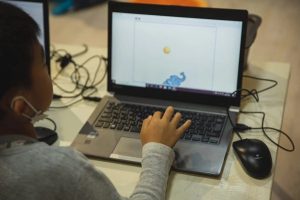
Image courtesy Ryutaro Tsukata-Pexels
As technology becomes increasingly ingrained in our daily lives, children spend more time in front of screens.
While screens can offer children many educational and entertainment opportunities, excessive screen time has been linked to several negative effects, including poor sleep, decreased physical activity, and developmental delays.
Fortunately, there are many steps parents can take to minimise the negative effects associated with children spending too much time in front of screens. Here are some tips to help you manage your child’s screen time and promote healthy habits:
1. Set Limits

Image courtesy Alex Green-Pexels
Setting limits is the first step to managing your child’s screen time. Recent studies recommend that children aged 2 to 5 should not have more than 1 hour of screen time per day and that children aged 6 years and older consistently limit how much time they spend in front of screens.
Establish clear rules for screen time in your home, such as not watching television or using electrical gadgets during meal times or before bed. Make sure you enforce these rules consistently.
Encourage your child to engage in other activities, such as reading or playing outside, to balance their screen time with other forms of entertainment.
2. Monitor Content

Image courtesy Nicole Barts-Pexels
Not all screen time is created equal. While some educational apps and shows can offer valuable learning opportunities for children, other content can be harmful or inappropriate.
Monitor the content your child is accessing on their devices, and use parental controls and content filters to restrict access to inappropriate content.
Encourage your child to watch educational programming, play educational games, and take an active interest in the content they engage with.
3. Encourage Physical Activity

Image courtesy Kindel Media – Pexels
One of the negative effects of excessive screen time is a decrease in physical activity. Children who spend more time in front of screens are less likely to engage in outdoor play or other hobbies, which can lead to obesity and other health problems.
Encourage your child to engage in physical activity by setting aside time for outdoor play or sports and making the activities a family priority.
Take family walks or bike rides, play active games together, and make sure your child has plenty of opportunities to move their body throughout the day.
4. Establish Tech-Free Zones

Image courtesy Cottonbro Studio-Pexels
Establishing tech-free zones in your home. Create spaces where screens are not allowed, such as bedrooms or the dinner table, and encourage your child to engage in other activities in these spaces.
Having tech-free zones can promote healthy sleep habits, improve family communication, and encourage children to engage in other forms of entertainment.
5. Model Healthy Screen Time Habits

Image courtesy Annushka Ahuja – Pexels
Children learn by example, so parents must model healthy screen time habits. Ensure you are following your rules for screen time, and limit your use of screens in front of your children.
Encourage family members to engage in other activities, such as board games or reading books, and prioritize family time and communication over screen time.
As a parent, you play a significant role in shaping your child’s habits, including their screen time habits. Modelling good screen habits is paramount.
Avoid using screens during meal times, bedtime, and family time. This will help your child understand that there is a time and place for screens and that it is essential to prioritize other activities in life.
Additionally, it is crucial to have open communication with your child and discuss the importance of reducing screen time to maintain a healthy and balanced lifestyle.
6. Monitor Sleep Habits

Image courtesy Ketut Subiyanto – Pexels
Screen time has been linked to poor sleep habits in children, which can negatively affect their physical and emotional health.
To minimise the negative effects of screen time, it’s important to monitor your child’s sleep habits and establish a consistent sleep routine.
Limit screen time before bed, and establish a regular bedtime and wake-up time to promote healthy sleep habits. Ensure your child’s bedroom is conducive to sleep, with a comfortable mattress and a dark, quiet environment.
7. Take Breaks

Image courtesy Jep Gambardella
Encouraging your child to take breaks from screen time is an effective way to minimize the negative effects of prolonged screen use. According to experts, children should take a 10-minute break for every hour of screen time.
It’s essential to ensure they engage in physical activities such as stretching, running, or simply walking around during these breaks.
Participating in these activities can help reduce the strain on their eyes, improve blood circulation, and promote good posture.
You can also set a timer or use an app to remind your child to take a break every hour or so and encourage them to engage in other activities during these breaks. Taking breaks from screens can help prevent eye strain and unnecessary headaches.
Conclusion

Image courtesy Katerina Holmes – Pexels
Acknowledging that technology and screens are a part of our everyday lives and that it is impossible to eliminate their use is important.
However, you can take proactive steps to minimise the negative effects of screen time on your child. You can achieve this by encouraging physical activity and social interactions.
By implementing these strategies, you can ensure that your child can use technology responsibly and have a healthy and well-rounded childhood experience.
Remember, technology is a tool that can be used for good or bad, and it is up to you to guide your child.
